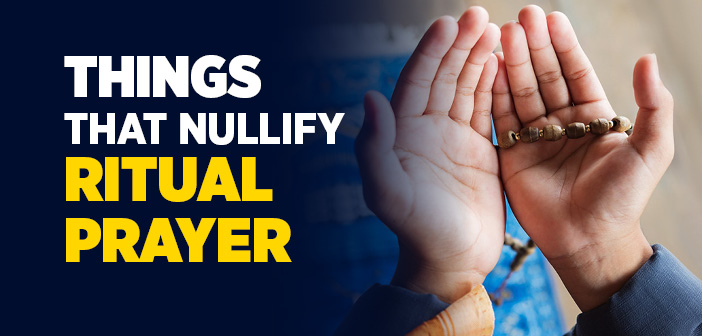What is things that nullify ritual prayer?
The following are the things that nullify the prayer:
- Uncovering the awrah parts of the body even if it is for a short moment. If a child opens a person’s cover while praying, the prayer becomes invalid even if the person covers his/her awrah right back up. However, if some of the awrah parts of body get uncovered without being aware of it and if they are covered immediately when the person becomes aware of it, there is no harm in that.
- If the state of minor ablution is nullified for a reason.
- If something impure stains one’s body, clothes, or the place where he performs the prayer. If one sees the impurity on his prayer cap or on his shoes and takes them of while praying, his prayer will not be invalidated.
- Having doubts about the intention or one of the essential parts of the prayer. Changing intention while praying. However, it does not invalidate the prayer if someone changes his intention while performing an unqualified four-cycle supererogatory prayer in order to catch up with the congregation. The person praying does not have to do anything if he/she after finishing the prayer feels doubts about whether or not she/he did one of the essential acts of prayer.
- Saying a word consisting of two letters, even if it does not have any meaning, or saying a word with only one letter, but which has a meaning, invalidates the prayer. If one utters at least two letters clearly such as oho oho when crying, sneezing or coughing, it invalidates the prayer. Uttering a word with only one letter, which is customarily considered normal to be uttered when sneezing, does not nullify the prayer. Clearing one’s throat in order to recite the Qur’an better is excused. Staying quiet by forgetting or staying quiet for a short time while praying does not invalidate the prayer.
- Extending i’tidal, which is a short act that should not last as long as the recitation of chapter al-Fatiha, and extending the sitting between two prostrations for as long as the tashahhud.
- Responding to a call coming from someone who is not part of the prayer invalidates it. However, a prayer is not invalidated if a person praying who is asked a question answers the question by reciting a verse from the Qur’an with the intention to recite it as part of his prayer.
- Responding to greetings by saying “Wa alaikum salam”. However, recitation regarding the remembrances of Allah or invocations, even in parts of prayer where the recitation of an invocation is not recommended, will not nullify the prayer.
- Laughing while praying (If it is loud enough to be heard by others, it also nullifies the minor ablution according to the Hanafi School). Smiling does not invalidate the prayer.
- Intentionally performing an essential act of prayer such as ruku’ and prostration more than it is required (In some other madhhabs this does not nullify the prayer). However, if one repeats the recitation of chapter al-Fatiha or invocation of tahiyyat or recites another remembrance of Allah or moves his lips, tongue, or fingers several times, it does not nullify his prayer. Reciting the additional parts of the Qur’an after Fatiha from a hardcopy of the Qur’an and turning the pages of the hardcopy of the Qur’an does not invalidate the prayer.
- Doing excessive acts (Fi’il kathir) or carrying out too to many acts not related to prayer. For example, taking more than three steps, jumping, or hitting a person intentionally nullifies the prayer. Moving one’s hands or legs during the performance of the Prayer of Fear (Salat al-Khawf) while on a vehicle or a mount does not invalidate the prayer. Bending down or moving to kill a harmful animal like a snake, a scorpion etc. does not nullify the prayer. One who is performing a prayer is allowed to straighten up his clothes, to point out to a person, and to push or stop a person who tries to pass before him.
- Eating or drinking something. If one chews gum, swallows the remnants of food in his mouth or licks candy, his prayer will be nullified.
- Intentionally turning or being forced to turn the chest from the direction of qiblah. However, if someone who is forced to turn away from the direction of qiblah or turns away from the qiblah by mistake and turns back to the direction of qiblah immediately, his prayer will not be invalidated.
- Rushing and doing an essential act before the imam or staying more than two essential acts behind an imam without an excuse. If the one (muqtadi) who prays in congregation and follows an imam remembers while sitting that he forgot to perform an essential act other than the intention and the beginning takbir, he should make up this mistake by performing an additional cycle after the imam finishes the prayer. He does not have to perform the prostration of forgetfulness at the end of prayer.
- If the time limit for wearing khuff (leather socks) ends.
Source: Fiqh1 (According To The Shafi’i School Of Islamic Law), Erkam Publications





